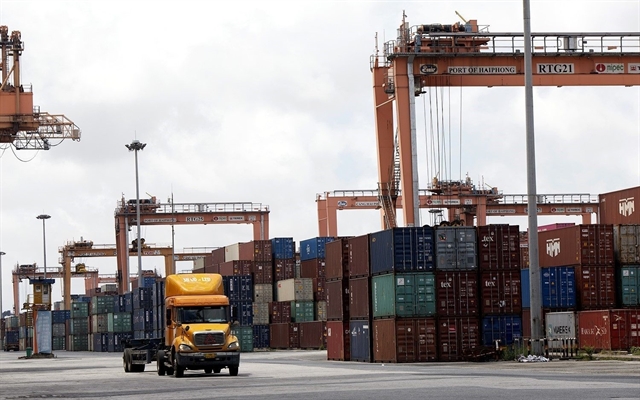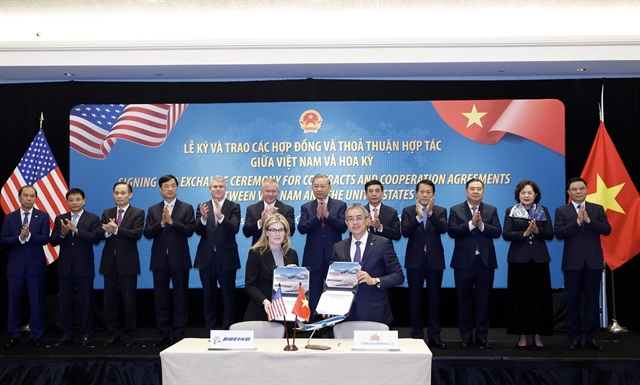 Opinion
Opinion

 |
| Permanent Deputy Minister of Foreign Affairs Nguyễn Minh Vũ. — Photo baoquocte.vn |
On August 8, the United Nations (UN) Ad Hoc Committee on Cybercrime approved the draft of a convention against cybercrime. Following this significant development, Permanent Deputy Minister of Foreign Affairs Nguyễn Minh Vũ talked with media about this global issue.
Could you tell us about the negotiation process for the United Nations Convention on Cybercrime Prevention?
The negotiation process for the United Nations Convention on Cybercrime Prevention stands out as one of the most significant diplomatic efforts at the UN in recent years, with direct contributions from over 150 countries. Several key factors explain the considerable attention and support this process has received.
Firstly, cybersecurity has emerged as a major concern for the international community, fuelled by the explosive growth of information and communication technologies. While cyberspace brings immense benefits, the rise in cybercrime has become increasingly alarming.
Cyberattacks have evolved rapidly in both form and scale, posing serious threats to the economic, political and social stability of nations. They undermine sovereignty and erode trust between countries due to the cross-border and anonymous nature of cyberspace.
However, the UN currently lacks a unified legal framework to facilitate international cooperation in sharing information, coordinating investigations and gathering evidence related to cybercrime. This highlights the urgency of developing and adopting a UN convention on cybercrime prevention.
Secondly, the draft convention is expected to establish a legal framework that strengthens international cooperation in combating cybercrime.
It affirms the sovereignty and responsibility of each nation in preventing cybercrime while safeguarding fundamental human rights online. The draft criminalises eleven of the most egregious forms of cybercrime, standardises six specialised operational measures and sets up a 24/7 cooperation mechanism between law enforcement agencies of countries to ensure timely and effective judicial assistance.
It also encourages collaboration with experts, associations and technology companies to prevent and combat cybercrime. Moreover, it allows for early discussions on additional protocols to keep pace with the rapid advancement of technology and emerging types of cybercrime.
Thirdly, once in force, it will become the first global international legal instrument to govern cyberspace, reinforcing the United Nations' role in promoting international law to establish a cooperative framework for addressing cyberspace issues.
The convention will also bolster and further develop the UN's body of international legal instruments in crime prevention, such as the United Nations Convention against Corruption (UNCAC) and the United Nations Convention against Transnational Organised Crime (UNTOC).
The consensus among nations on the draft convention underscores the value and importance of multilateralism at the United Nations in addressing common challenges facing the international community.
The draft convention is the result of a negotiation process that required compromise on differing, and sometimes conflicting, national perspectives, interests and practices concerning the convention's scope, principles of law enforcement, international cooperation and technology transfer.
As such, the successful negotiation of the draft convention is highly encouraging, particularly for developing countries, as it helps to narrow the digital divide between nations.
What significance does the approval of the draft convention hold for Việt Nam?
Việt Nam is among the world's top nations in terms of internet penetration, with 78.44 million users as of early 2024, representing 79.1 per cent of the population.
In 2023, official statistics recorded nearly 16,000 reports of online fraud, leading to losses of VNĐ390 trillion, a significant 64.78 per cent increase from the previous year.
Since the start of 2023, Việt Nam has experienced over 13,750 cyberattacks on its information systems, resulting in serious incidents.
Recognising the growing threat from cybercrime and the need for enhanced international collaboration, the Ministry of Foreign Affairs, the Ministry of Public Security, and other Vietnamese agencies have been actively involved in the discussions and negotiations of the convention since its early stages in 2022.
Việt Nam's consistent support for establishing the negotiation mechanism and its active engagement throughout the eight sessions of the specialised committee highlight the country’s role as a responsible and proactive member of the international community, contributing to global issues and fostering international peace and stability. The approval of the draft convention is highly significant for Việt Nam for several reasons.
Firstly, it provides a comprehensive legal framework that allows Vietnamese authorities to build and strengthen cooperation with law enforcement agencies worldwide. Given the transnational nature of cybercrime, such international cooperation is essential for enabling timely investigations, information sharing and evidence collection needed for prosecution and judicial processes.
It also addresses the existing disparities in technological capabilities and digital infrastructure among countries. It offers developing nations, including Việt Nam, access to technical support, capacity-building resources and technology transfer, which will enhance their ability to prevent and respond to cybercrime. This will contribute to creating a safer and more robust global cyberspace.
Thirdly, Việt Nam’s early involvement and significant contributions to discussions on law enforcement, capacity building and technology transfer, as well as its role in coordinating procedural measures, have been impactful.
Through an inter-agency approach, Việt Nam has engaged comprehensively in all aspects of the convention, including diplomatic, legal, and technical areas.
This engagement reflects Việt Nam’s commitment to actively shaping multilateral institutions and the international political-economic order, as outlined in the 13th Party National Congress' Political Report, and aligns with the Party Central Committee's Directive 25 on enhancing and elevating multilateral diplomacy by 2030.
What are the next steps following the Committee’s approval of the draft convention?
Once the Committee approves the draft, it will be submitted to the United Nations General Assembly for formal adoption by the 193 member states at the earliest opportunity. After this, it will be open for signature by countries until December 31, 2026.
Moving forward, the Ministry of Foreign Affairs, the Ministry of Public Security, and other relevant Vietnamese agencies will need to focus on the official ratification, signing, and approval of the convention. This involves reviewing and updating Việt Nam's legal frameworks to ensure effective implementation of the convention’s provisions, considering the specifics of cybercrime.
Additionally, investment in infrastructure and technological capabilities will be necessary to comply with the convention’s requirements. It will also be important to collaborate with the United Nations and international partners to develop appropriate technical support programmes tailored to the needs of Vietnamese authorities.
The convention's approval marks the beginning of a comprehensive process that will require active and coordinated efforts from all involved ministries and agencies. — VNS




